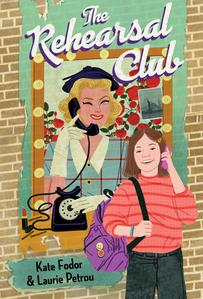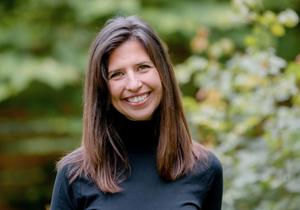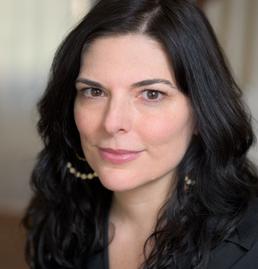 Kate Fodor is a playwright and television writer. She is currently a writer and co-executive producer on Stick, a forthcoming comedy series from Apple TV. Previously, she wrote and produced on Julia and The Marvelous Mrs. Maisel.
Kate Fodor is a playwright and television writer. She is currently a writer and co-executive producer on Stick, a forthcoming comedy series from Apple TV. Previously, she wrote and produced on Julia and The Marvelous Mrs. Maisel.
Laurie Petrou is an award-winning internationally published author. She is also an associate professor at Toronto Metropolitan University. She has a Ph.D. and master's in communication and culture, a diploma in new media design, and a Bachelor of Fine Arts, specializing in painting.
The Rehearsal Club ($17.99, Groundwood Books), a middle-grade novel about two girls who aspire to be actors during entirely different decades, is Petrou's fifth book and Fodor's debut. Here, Fodor and Petrou discuss their writing process, New York City, and the ambition of young women.
Laurie Petrou: The question I get asked the most about writing collaboratively is "how did we actually do it?" I think there is a misconception that co-authors write at the same time--live, in the moment--but I can't imagine doing that. Writing is something I need to be alone to do, so this was all new to me.
But you come from the screenwriting world, where writing is collaborative. How did novel writing differ from screenwriting? Is there anything that surprised you about our process or the process of writing a novel in general?
Kate Fodor: We sort of ended up using a TV writer's room process to write The Rehearsal Club by accident.... That model is to brainstorm together, outline together, divide up the actual writing, and then go off and do it alone. Then everyone comes back together to look at what we have and see if we can make it better together. So, I guess what surprised me was how unexpectedly similar the process was!

|
|
| Laurie Petrou (Pam West Photography) |
|
Petrou: Right, we outlined together, then took turns working on the drafts. We sent it back and forth with each iteration, added and subtracted things until we were happy, and then moved onto the next chapter. I feel like this worked perfectly!
Fodor: One of the things I loved about our process is the same thing I love about being in a writer's room: the knowledge that you're not alone in wrestling with the project. For some reason, even though I cherish solitude when I get it in other parts of my life, I really have to fight off loneliness when I'm writing alone.
Did you know when you were a kid that you wanted to be a novelist? Was that always the dream?
Petrou: I was always the "arty" kid. I was a visual artist for most of my childhood, teen years, and early 20s, but I was also always writing. With that came the requisite melodrama: I remember reaching the ripe old age of 18, which was how old S.E. Hinton was when The Outsiders published, and feeling like a failure because I hadn't yet done the same.
Eventually, between the art and the occasional theater stuff and the constant writing of prose and poetry, writing won. I never thought about it too much. I just kept doing things I liked and surrounded myself with people who inspired me. Now, there are challenges, but they never seem damning to me. I guess I'm an optimist at heart, a bit like Pal, our main character.
The Rehearsal Club involves a lot of theatrical places and references. You are a playwright, you live in New York City, but you also have introverted tendencies. How did your relationships with show business, theater, and New York inform the themes in the book? Do you see yourself or any aspects of your own life reflected in its pages?
 |
|
| Kate Fodor (photo: Alison Sheehy) |
|
Fodor: My family moved to Manhattan when I was just a little older than Pal, so it was easy for me to imagine the city through Pal's eyes. When you move to New York after growing up somewhere else, there can be these twin feelings of "I've finally found the place where I belong!" and "Everyone here is so much more sophisticated and knowledgeable--I'll never belong!" I had both those feelings and Pal does, too.
As a playwright and TV writer, I'm around a lot of actors, and I usually find them sort of magical. Like you said, I'm fairly introverted, so actors sometimes feel like another species. But I like that not all the characters in our book want to be performers. For example, Taylor is a visual artist and has some quieter aspects to their personality. The kids do all share a curiosity about the world and a need to dream of a future that feels true to who they are.
So, you and I were both readers when we were kids and, when I was Pal's age, I loved books like From the Mixed-Up Files of Mrs. Basil E. Frankweiler. The two of us intentionally tried to capture some of that spirit in The Rehearsal Club. What was your favorite book when you were around Pal's age, and do you think it informed The Rehearsal Club?
Petrou: I loved Gordon Korman's MacDonald Hall books. The characters are funny and adventurous and irreverent, and mischievous to a fault. As I became a parent to kids that age, I loved cozying up with The Penderwicks, Harry Potter, and The Mysterious Benedict Society books. There is an element of humorous chaos and curiosity in all of these that I love. And of course, who could forget the insatiable Anne of Green Gables, with her penchant for trouble-with-a-good-heart?
What I love most about our book is that although we've taken some liberties, the Rehearsal Club was a real place: a boarding house for aspiring actresses that opened in New York in 1913 and housed some of the greats over the decades, like Carol Burnett. We both fell in love with the history of the place. What do you think makes it so magical?
Fodor: I love the idea that even in 1913 (which is further back than our book goes) the Rehearsal Club was a living monument to female ambition. It existed to provide support for young women who were chasing their dreams--it was by its very nature a place where women were taken seriously as people with talents and plans. And then, of course, for us as storytellers, what could be better inspiration than dozens of young women with big personalities and big ambitions all piled into one crowded old brownstone?

